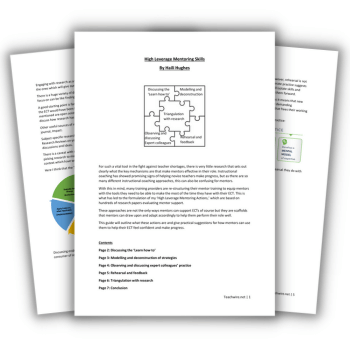School governors – Maximising their impact in your school

Learn how to work effectively with your school governors, what being a governor can do for your teaching career and more…

- by Teachwire
- Classroom expertise and free resources for teachers

As teachers, understanding the role of school governors and how to effectively collaborate with them can not only enhance your school’s success but also provide unique opportunities for professional growth.
Join us as explore what makes a great governor, innovative ways to raise their profile and how to involve your pupils in governance…
What are school governors and what do they do?
School governors are volunteers who help oversee the management and strategic direction of a school. They are part of a governing body that works alongside the headteacher to ensure the school:
- delivers high-quality education
- adheres to legal requirements
- efficiently uses resources
Governors also:
- set the school’s vision
- approve budgets
- hold the school leadership accountable for educational outcomes
School governors come from various backgrounds, including parents, staff, local community members, and sometimes representatives from local authorities or religious organisations, depending on the type of school.
Their role is crucial in ensuring the school meets the needs of its students and the wider community. School governors can provide:
- Momentum: If you know you have to talk something through with a governor, on a set date, then it keeps the momentum going. This is accountability in action.
- Triangulation: Leaders will think they have embedded something. Or that staff are pleased about a recent change. Governors will be able to tell leaders whether this is really true or not. This is not spying – it’s an extra pair of eyes and ears.
- Balance and focus: There is often a risk that a school is trying to change, or improve, or tweak too many things at once. Meetings with staff, and hearing what they are saying, will help gauge whether the balance is right.
- Diversity: We always need different brains and people with different experiences, thinking and contributing to the strategic direction of a school. Uniformity of thought is dangerous; governors bring an additional dimension.
Do school governors get paid?
No, school governors do not get paid. The role of a school governor is entirely voluntary and is intended to be a service to the community.
School governors contribute their time and expertise to help improve the school and ensure it provides the best possible education for its students.
What do parent governors do?
Parent governors are elected representatives on a school’s governing body. They bring the perspective of parents and guardians to the decision-making process.
They play a key role in ensuring that school leaders consider the views and concerns of parents in the school’s strategic planning and policy development.
While they advocate for the interests of all students and parents, parent governors must maintain a balanced and impartial approach, focusing on the broader needs of the school rather than individual concerns.
What makes a good school governor?
A good school governor is a ‘critical friend’ who supports and challenges. They bring skills and experience to enhance your organisation.
A good school governor should be organised and professional. They should not add workload to senior or middle leaders unless absolutely necessary.
Like educators, they should keep up-to-date with best practice, bring it back to school and adapt it to your context.
Challenge at a governance level should never be personal, aggressive or destructive. School governors should constantly ask senior leaders about how they are delivering the very best for each and every student.
A good school governor should listen to senior leaders and constantly ask, “How do you know?”. This self-reflection on significant decisions sharpens focus back to value for money, to enable teachers to deliver the richest and most effective curriculum.
School governors should check with senior leaders that the workplace is safe, clean and resourced adequately. They should ensure staff have every opportunity to excel at their role.
A school governor should never pass any judgement on teaching. It’s not their job to ‘keep tabs’ on you – it’s to look at the whole system, including the physical environment.
Good school governors should also thank staff for their efforts and when appropriate, nominate them for recognition.
How to work with school governors for the good of your school

Governor visits might at first seem like an extra meeting you don’t need clogging up your timetable, but here’s how you can make them work for you, explains Rebecca Leek…
Governor visit
There should be a very clear, articulated reason for the visit that you write down.
For example, it might be to find out the impact of a new action-planning approach where groups of subject leaders work together.
The school governor may meet with a group of subject leaders, ask about the action plan, and enquire about the impact so far – on workload, on building an interlinked curriculum, or on the learning in the classroom.
Annual cycles
I recommend schools outline a complete cycle of visits and governance activity in advance, preferably for the full year.
For example, the internal school diary could have ‘governor visits’ marked for a particular week.
If you schedule these at the right time, then it will mean a brief write-up will also feed into the correct committee meeting, a week or two later.
Lurching changes and unexpected meetings are terrible for staff wellbeing. Avoid at all costs.
Systematic paperwork
Don’t let meetings happen over blank pieces of paper. The purpose should be at the top. Include some suggested questions to ensure a quality discussion.
For example: What is the timeframe for this work? How does this relate to the school improvement plan? Is there anything that is hindering the likelihood of the success of this work?
Focused activity
The visit should link back to the overarching priorities for the school. We can only achieve a certain amount and a scattergun approach is inefficient. Governors and staff should know what the aims are. Focus activity around these areas.
I have deliberately not mentioned Ofsted, although these meetings will inevitably help you gain confidence if an inspection is on the horizon.
But at the end of the day, the key aim is to keep our schools healthy and dynamically improving.
Visits from school governors, when done well, can be really effective in keeping the cogs turning – for the good of the school.
Rebecca Leek is executive director of the Suffolk Primary Headteachers’ Association and works as a freelance speaker, trainer and writer. Follow her on X at @rebeccaleek_ and see more of her work at rebeccaleek.com
How to raise the profile of your school governors
Understanding of school governance can be sketchy amongst staff members and parents alike, says Naureen Khalid – so here are some ways to change that…
1. Invite staff members to meetings
Heads and senior members of the leadership team usually always attend school governor meetings. It would be good if you occasionally invited other staff members too.
If you are planning or rolling out a new initiative, for example, then you could ask the staff member running it to do a presentation to the governing body.
Governors get to hear directly from the staff member, who in turn gets to know the governors. However, do think about workload implications before doing this.
2. Attend school events
It’s always good when governors are able to attend social events at their schools. It means they can see the pupils in a non-academic context, and it’s a good way for them to form an opinion about the school’s culture and ethos.
Staff members and pupils who are involved in arranging these will appreciate governors taking the time out to attend, and give positive feedback; helping them to realise that governance really isn’t all about improving exam results.
3. Be at parents’ evening
There is usually a good turnout at parents’ evening. With a fair amount of waiting around between appointments, governors can use this time to chat with parents.
They could even ask them to complete a short questionnaire, which might highlight common trends/concerns.
If this option is chosen, then feeding back to the community is important – a ‘you asked, we did’ section in the school newsletter can be a good way to do this.
Trending
4. Communicate with students
Raising the profile of school governors amongst pupils is important, too. If your school has a student parliament or a forum for young leaders to meet and discuss issues, then ask if you could go along to one of these.
This will give you an opportunity to hear directly from learners, and feed back to the governing body. In addition, why not ask the head if you could speak at an assembly, allowing you to tell the student body more about governance, and what governors do?
5. Visit regularly
Governor visits are an important part of the role. They are essential for monitoring, and should have a focus and an agreed aim – and they should be arranged beforehand, so staff aren’t taken unawares.
Some governing bodies arrange a visit when all governors come in and see a particular subject/area/initiative and then join the staff for tea or coffee in the staff room. Bringing cake or biscuits along can help ensure everyone is in a collaborative mood!
6. Stay transparent
Given that approved, non-confidential minutes of governing body meetings have to made available to anyone who asks to see them, it would be a good idea to publish these on your website.
This shows transparency, helps engage people with your work, and demystifies governance.
It will be especially appreciated if the governing body is considering a major change, such as converting to an academy, joining a multi-academy trust, appointing a head teacher, etc.
Naureen Khalid is a trustee in a MAT and also chairs two local governing bodies. She is the co-founder of @UKGovChat, and blogs at Governing Matters.
6 ways being a school governor can improve your teaching
Seeing how other schools do things can help develop your practice, says Steve Edmonds…
1. Gaining perspective
Governing provides you with a helicopter view, rather than the classroom view, and that’s helpful because it explains how a policy – for instance, ‘a focus on writing’ – moves from being strategic to being taught.
The opportunity to see how another school, or group of schools, implements something is genuinely interesting, too. Understanding different approaches can inform your own thinking and help you to bring new ideas back to your own school, or classroom.
2. Understanding responsibilities
Being a school governor provides useful insight into aspects of school life with which you may be less familiar, such as budget and finance, health and safety, and risk management.
Many schools use an integrated curriculum and financial planning approach, so sitting on the finance committee can develop your understanding about how curriculum decisions impact the school’s budget, etc.
3. Improving questioning and challenging skills
School governors hold the headteacher to account, and one of the key ways they do this is to ask questions and constructively challenge.
These are valuable skills for teachers to develop and can be applied in the classroom, in staff meetings and other professional contexts.
Understanding the right question to ask sounds straightforward but there is an art to it. A good, thoughtful question finds out how things are working and what can be done collaboratively to improve, e.g. “How do we make this work?” rather than “Is this going to work?”.
4. Reflecting on your professional practice
The chance to oversee the strategy of another school provides a useful means to reflect on your own practice.
Your contribution to discussions and decision making at the school – or trust – you govern, will require you to look in different ways at areas such as the curriculum, behaviour, attendance and meeting the needs of pupils with SEND.
This will both deepen your understanding and benefit your professional practice. Visiting your school in a governing capacity and talking to fellow teachers also provides a chance for valuable professional dialogue.
5. Developing as a leader
Leadership is not just the domain of leaders. It’s important for us all to be able to lead – wherever we may be in our career.
Governing can help to develop these skills. At the National Governance Association, we regularly hear from teachers who say that governing is the most valuable CPD they have experienced.
Governing also provides numerous opportunities for professional development and training, whether in terms of the initial induction or to develop your knowledge in a specialist area such as safeguarding or finance.
6. Preparing for leadership roles
Of course, governing is also incredibly useful preparation for leadership roles, whether taking the reins as a head, or as a deputy or assistant head.
One of the core functions of governance is to hold leaders to account for the educational performance of the school or trust.
This provides a solid understanding of what a board’s priorities are and the information they require, which is really useful in a senior leadership role where you will be expected to work closely with your own governing board.
Steve Edmonds is director of advice and guidance at the National Governance Association (NGA).
Appointing pupils as associate school governors

How better to get constructive feedback on teaching and learning in your school than to ask those with the biggest stake, asks Jon Rees…
School councils, when run effectively, can empower pupils to make a real difference in their own schools. But, even with the best will in the world, their accomplishments – while commendable – are often limited to a remodelling of the playground.
This kind of pupil voice is great for giving young learners a say in things that matter to them, but an Associate Governor initiative can give pupils a voice in all areas of school life.
It’s a chance for them to evaluate and help shape teaching and learning so that children can become as excited about being in the classroom as they are about using the new climbing frame in the playground.
Sharing the findings
The first question, though, is how their findings and recommendations can be shared. We tried a pupil SEF (school self-evaluation form).
At the preliminary board meetings – chaired and minuted ably by members of the Associate Governor team – the children drafted an abundance of questions that would drive the group’s evidence gathering:
- How do children get the right amount of work to do and how does everyone get the same chances?
- How does the head set high expectations, and are they high enough?
- How do teachers help children when they’re ‘stuck’ and is there anything more they could do?
These were just some of the quandaries our young team would set off to investigate.
It was a delight to watch them grow in their role. Although initially apprehensive about entering classrooms, they soon began to talk with confidence to their peers, demonstrating great skill and empathy.
It became clear that the responses they were receiving were much more forthright and valid than those that might have been gained had an adult asked the same questions.
Group conferencing sessions
They led group conferencing sessions with a proficiency and naturalness that no amount of leadership training could instil. They even played a major part in a whole-school maths review day, during which they worked alongside local heads and experienced leadership consultants to ensure standards of teaching and learning were consistently high.
“I’m tired out! I never knew it was so hard working with children,” said one exhausted but pleased Associate Governor.
Our first pupil SEF is now complete. It has been presented by the pupils to the head, governors and even the CEO. It is becoming an integral part of school improvement.
The Associate Governor project has expanded to include all three Bristol E-ACT schools; the pupils from each routinely get together to share good practice and further develop the role.
Jon Rees is a Year 6 teacher and literacy lead at Greenfield E-ACT Academy, Bristol.










